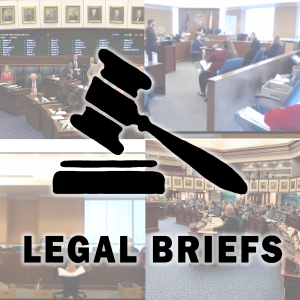Plus, another Noland’s Roofing AOB loss
 A Florida appeals court reaffirms that the bad-faith litigation reform law cannot be applied retroactively, a Citizens water leak claim provides clarification on constant or repeated seepage rules, plus the Fifth District Court of Appeals upholds that an assignee may not reassign an AOB to sidestep statutes. It’s all in this week’s Legal Briefs.
A Florida appeals court reaffirms that the bad-faith litigation reform law cannot be applied retroactively, a Citizens water leak claim provides clarification on constant or repeated seepage rules, plus the Fifth District Court of Appeals upholds that an assignee may not reassign an AOB to sidestep statutes. It’s all in this week’s Legal Briefs.
Bad-Faith Claims Reform: Part of the 2022 major insurance law changes, Florida statute 624.1551, aimed to eliminate the rampant claims of bad-faith by requiring a judge to declare a breach of contract on the insurance claim. This change had widespread impact, even on claims that happened before the overhaul – including a 2020 hurricane claim from homeowner Cindy Vo, who was denied by Scottsdale, the company now known as Nationwide E&S Insurance. Vo’s claim was dismissed because no such breach of contract was found. Scottsdale ended up settling in this particular case, but other bad-faith allegations sprung up. Their attorney argued in a separate lawsuit that such remedial laws have been allowed to be applied retroactively. While the lawsuit was initially dismissed, on appeal the 1st DCA judges reversed the decision, finding the law to be remedial in nature, but unable to be retroactively applied because it eliminates a previously valid cause of action. As such, Scottsdale’s motion to dismiss was denied, Vo’s lawsuit was reinstated, and Florida has a simple one-word answer to retroactive application of bad-faith reform laws – no.
Citizens and Seepage: Generally, with water damage insurance claims, the crux of the issue is whether the leak was a slow, continuous one or a sudden event, with insurance only covering the latter. In Citizens v. Ramon Arias, this issue was further investigated, as Arias filed three partial summary judgement motions over water damage in his home, which Citizens argued was not covered by his policy because it was caused by repeated wear and tear and the deterioration of a plumbing line. Citizens’ engineering inspection report of Arias’ home supported its position but could only see the continued wear and tear after said inspection, according to the court. The court ruled in Arias’ favor but the 3rd DCA recently overturned the ruling. Among the takeaways: that a constant and repeated seepage exclusion doesn’t permit coverage for damage occurring before it becomes constant; that the wear and tear does not have to start after policy inception to be excluded; and that a genuine competing factual position precludes summary judgment.
AOB Subversion: In 2019, after roof damage was incurred, a loss was reported and a direction to pay was executed with Noland’s Roofing. After receiving the decision from American Integrity Insurance, an Assignment of Benefits (AOB) agreement was executed by the homeowner with Holding Insurance Companies Accountable (HICA), who expressly stated “it does not provide services to protect, repair, restore, or replace the insured’s property.” The homeowner executed an acknowledgement for HICA to hold American Integrity to their obligations and ensure the direction to pay with Noland’s Roofing was honored. The 5th DCA found HICA non-compliant with section 627.7152, based on their pass-through language requiring it to pay for services subject to the statute. Even though HICA does not perform repairs, they seek funds to facilitate said repairs. You can read more about this and the previous case in Kelley Kronenberg’s First-Party Property Appellate Division’s “In The Know” latest monthly newsletter.

